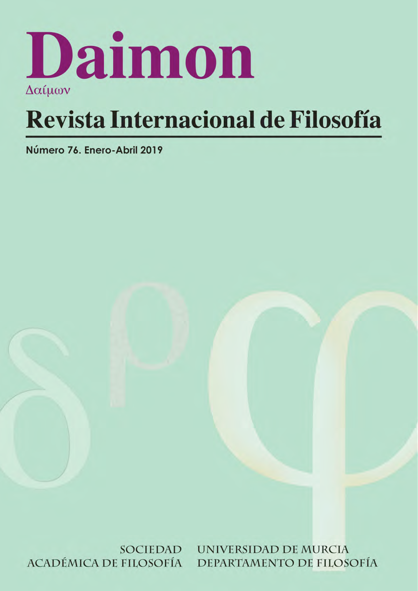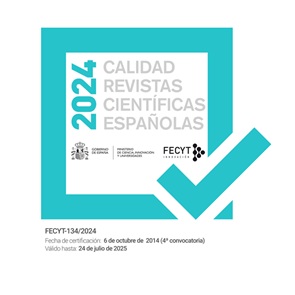The Ethics and the Practical Reasoning: About Common Sense and Programming
Resumen
This paper discusses the issue of practical reasoning, considering it as a field of study shared among three areas: ethics, common sense and programming languages. It questions the exclusive connection of practical reasoning to the area of ethics, and seeks to show through analysis of examples that other areas of common sense and programming languages also have important elements that characterize practical reasoning. We conclude that practical reasoning cannot be assumed solely from ethics, but it should open a research through the plurality of philosophical discussion.
Descargas
-
Resumen632
-
pdf 447
Citas
ALLAN, D. J. (1955): “The Practical Syllogism”. In: MANSION, S. Autour d’Aristotes. Louvain.
BAIER, Kurt (1995): The Rational and the Moral Order: The Social Roots of Reason and Morality. Chicago: Open Court.
BRATMAN, M. E. (1987): Intentions, Plans, and Practical Reason. Cambridge: Massachusetts University Press.
BROOME, J. (2002): “Practical reasoning”. In BERMÙDEZ, J.; MILLAR, A. (eds.). Reason and Nature: Essays in the Theory of Rationality. Oxford: Oxford University Press, p. 85-111.
BROOME, J. (2005): “Have We Reason to Do as Rationality Requires? A Comment on Raz”. In: Journal of Ethics and Social Philosophy. Volume 1, Symposium I, issue 1, April. http://www.jesp.org/articles/
BROOME, J. (2009): “The Unity of Reasoning?”, in ROBERTSON, S. (ed.) Spheres of Reason. Oxford: Oxford University Press, p. 62-92.
GAUTHIER, D. (1986): Morals by agreement. Oxford: Oxford University Press.
GAUTHIER, René Antoine; JOLIF, Jean Yves (1959): L’Etique a Nicomaque (comentaire). Paris: J. Vrin, vol. 1 y 2.
HARSANIY, J. C.; SELTEN, R. (1988): A General Theory of Equilibrium Selection in Games. Cambridge: MIT Press.
KNAPIK, M.; JONHSON, J. (1998): Developing Intelligent Agents for Distributed Systems: Exploring, Architecture, Technologies, and Applications. MacGraw-Hill.
NILSSON, J. Nils. (1971): Problem-Solving Methods in Artificial Intelligence. McGraw-Hill.
RAZ, J. (2005 a): “The Myth of Instrumental Rationality”, Journal of Ethics and Social Philosophy. April. http://www.jesp.org/articles/
RAZ, J. (2005 b) “Author's Reply: Joseph Raz, ‘Instrumental Rationality: A Reprise’”. In: Journal of Ethics and Social Philosophy, Volume.1, Symposium 1, issue 1. April, http://www.jesp.org/articles/
RUSSELL, Stuart; NORVIG, Peter. (2010): Artificial Intelligence: a modern approach. New Jersey: Prentice Hall, 3ª ed. [tradução portuguesa RUSSEIL Stuart; NORVIG Peter. Inteligência Artificial. Rio de Janeiro: Elsevier, 2004. Tradução de Vandenberg D, de Souza].
STEELS, L. (1990): “Cooperation between distributed agents through self organization”. In: DEMAZEAU, Y.;
MÜLLER, J. P. (eds.). Decentralized AI: Proceeding of The First European Workshop on Modelling Autonomous Agents in Multi-Agent World. Amsterdam, p.175-196.
STREUMER, B. (2010): “Practical Reasoning”. In: O’CONNOR, T.; SANDIS, C. (eds.) The Blackwell Companion to the Philosophy of Action. Oxford: The Blackwell Publishing, p. 244-251.
VON NEUMANN, J.; MORGENSTERN, O. (2004): The Theory of Games and Economic Behavior. Princeton: Princeton University Press, Sixtieth-Anniversary Edition.
WALTON, D. (1992): “Practical Reasoning”. In: BECKER, L. C.; BECKER, C. B. (eds.). Encyclopedia of Ethics. New York: Cambridge University Press, vol. 2, p. 996-1000.
WIGGINS, D. (2001): “Deliberation an Practical Reasoning”. In: MILLGRAM, E. (ed.) Varieties of Practical Reasoning. Cambridge: MIT Press, p. 279-299.
WOOLDBRIDGE, M.; JENNINGS, N. (1995): “Intelligent Agents: Theory and Practice”, Knowledge Engineering Review, January, v. 10:2, p. 115-152.
WRIGHT, von H-G. (1972): “On So-Called Practical Inference”. In: Acta Sociologica v. 15, January, p. 39-53.
Las obras que se publican en esta revista están sujetas a los siguientes términos:
1. El Servicio de Publicaciones de la Universidad de Murcia (la editorial) conserva los derechos patrimoniales (copyright) de las obras publicadas, y favorece y permite la reutilización de las mismas bajo la licencia de uso indicada en el punto 2.
2. Las obras se publican en la edición electrónica de la revista bajo una licencia Creative Commons Reconocimiento-NoComercial-SinObraDerivada 3.0 España (texto legal). Se pueden copiar, usar, difundir, transmitir y exponer públicamente, siempre que: i) se cite la autoría y la fuente original de su publicación (revista, editorial y URL de la obra); ii) no se usen para fines comerciales; iii) si remezcla, transforma o crea a partir del material, no podrá distribuir el material modificado.
3. Condiciones de auto-archivo. Se permite y se anima a los autores a difundir electrónicamente las versiones pre-print (versión antes de ser evaluada) y/o post-print (versión evaluada y aceptada para su publicación) de sus obras antes de su publicación, ya que favorece su circulación y difusión más temprana y con ello un posible aumento en su citación y alcance entre la comunidad académica. Color RoMEO: verde.











